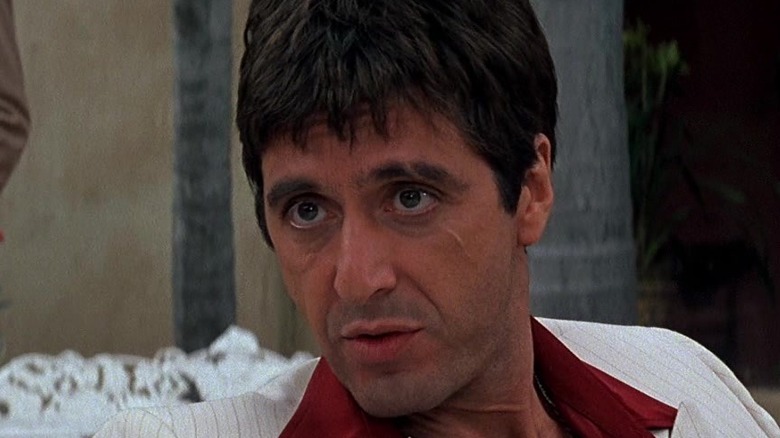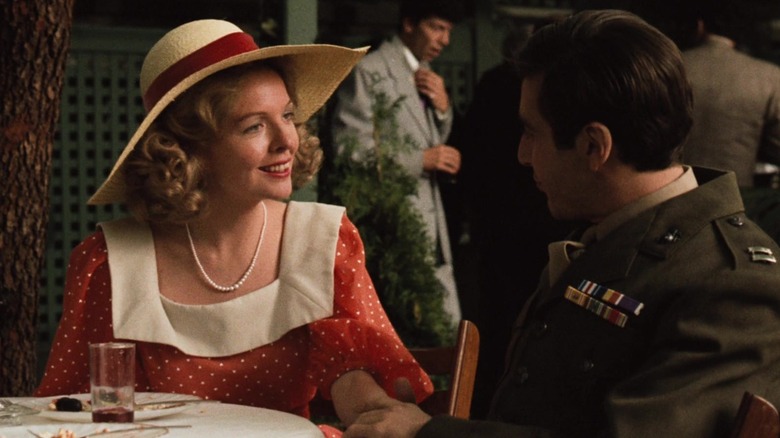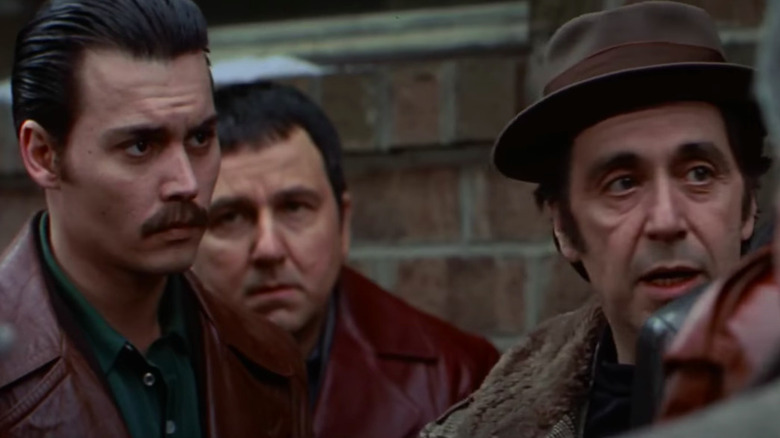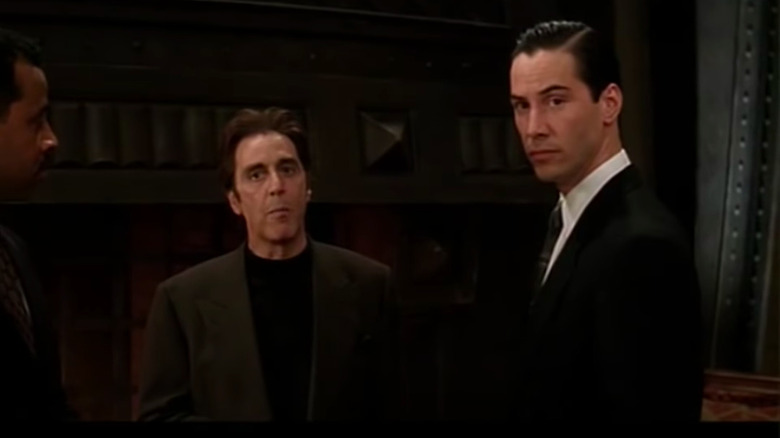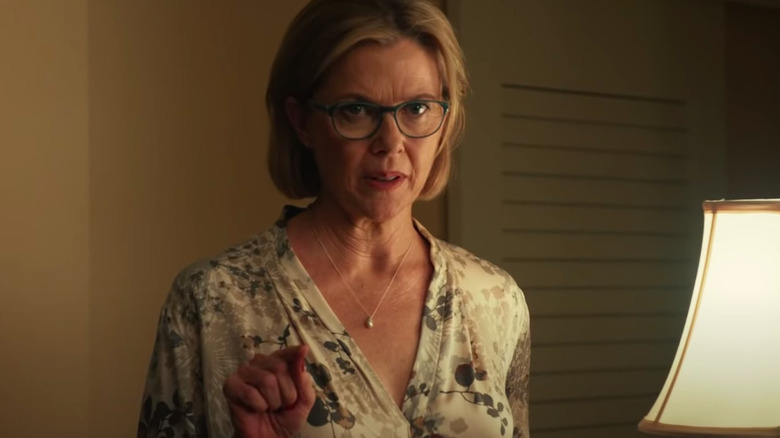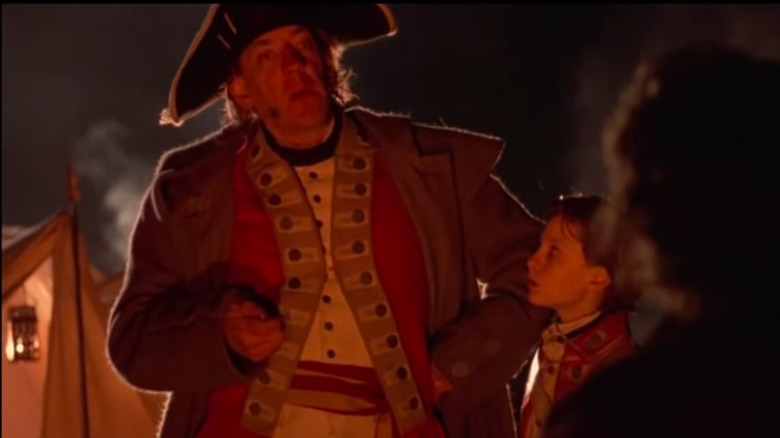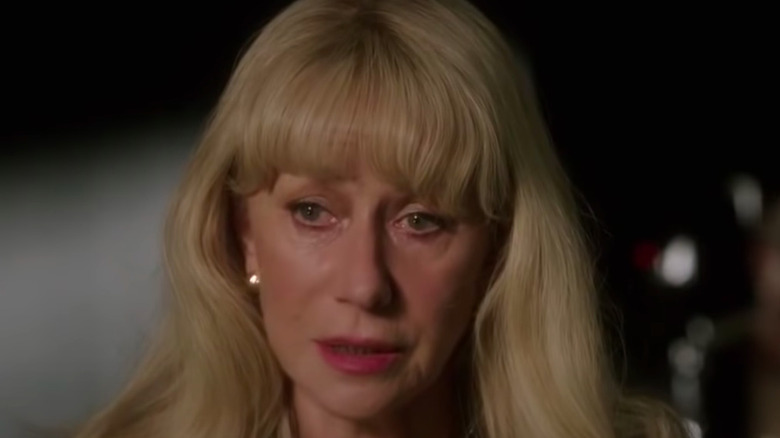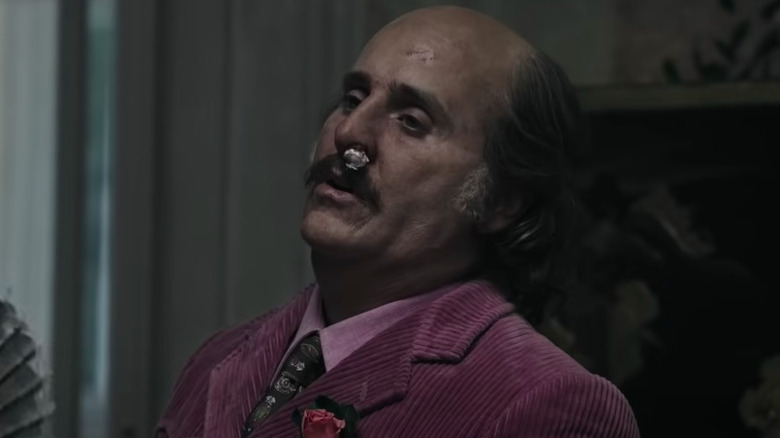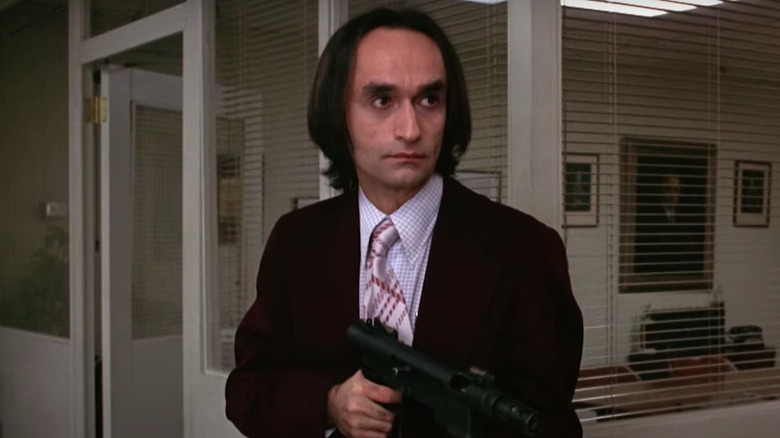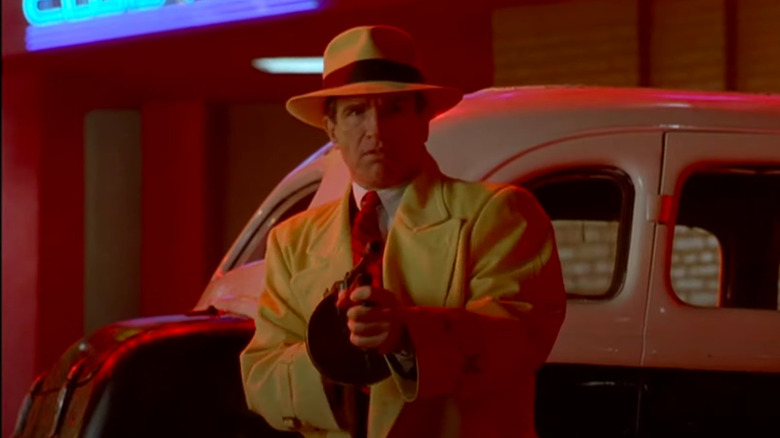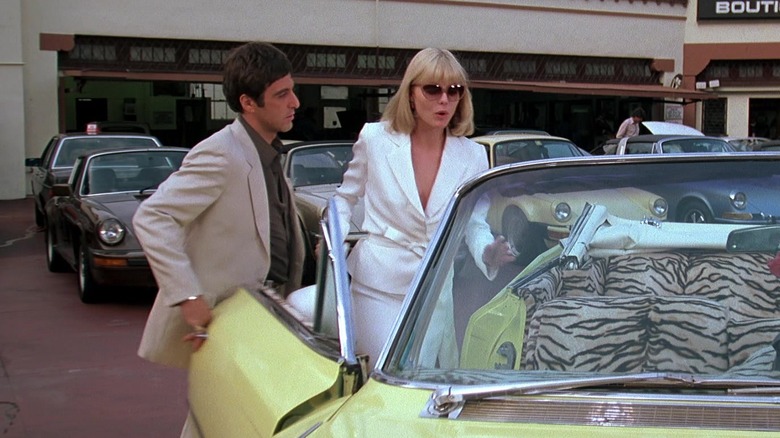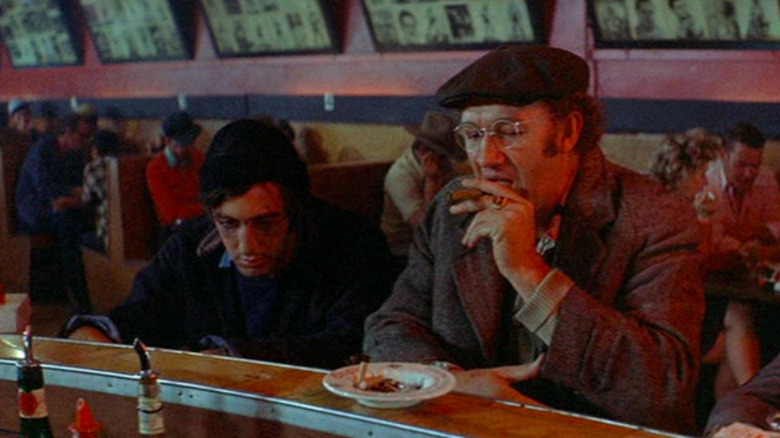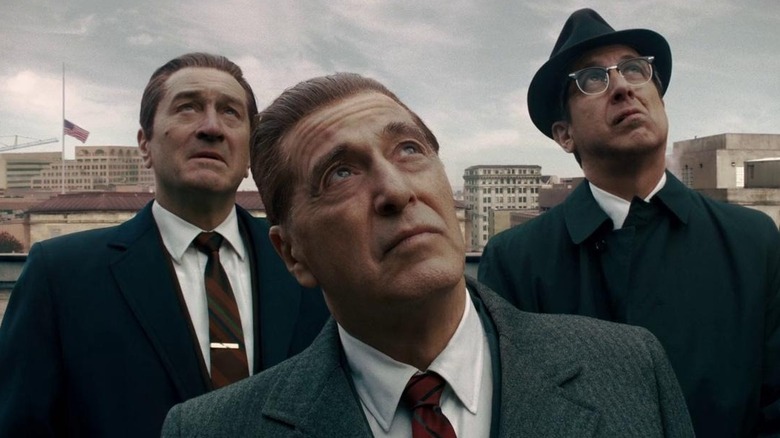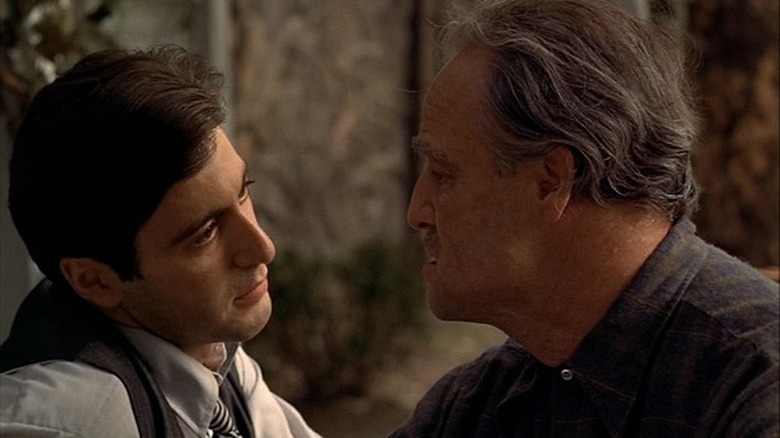Al Pacino's Best Co-Stars Ranked
One of the greatest actors of all time, Al Pacino has enjoyed a career that stretches back to the 1960s. He got his start as a stage actor before making his first major film appearance in 1971's "The Panic in Needle Park." Francis Ford Coppola took note of the young New York actor and fought to cast him as Michael Corleone in 1972's "The Godfather." The rest, as they say, is history.
After breaking into the mainstream with "The Godfather" and its sequel, Pacino solidified his reputation with hit movies like "Serpico," "Dog Day Afternoon," "And Justice For All," and "Scarface." Many A-List actors would feel lucky to have one of those movies in their career, but Pacino's resume consists almost entirely of generation-defining classics. Over the years, Pacino has shared the screen with countless actors. His co-stars have ranged from established cinematic icons to rising stars who would become iconic in their own right. These are Looper's picks for Al Pacino's greatest co-stars.
13. Diane Keaton (The Godfather)
While Al Pacino had appeared in movies before "The Godfather," it was Francis Ford Coppola's mafia epic that made him a star, alongside pretty much everyone else in the film. In his first scene, young Michael Corleone is introduced alongside his girlfriend, Kay Adams, played by Diane Keaton. She represents the high society life that Michael could have if he escapes his family's business of murder, extortion, and organized crime. Alas, when his father is gunned down in the streets by a rival crime family, Michael trades his future for revenge. At every opportunity, when Michael is given the opportunity to escape, represented by Kay and their children, he always chooses his crime family first.
Diane Keaton stars in all three films, serving as a ray of sunshine in the otherwise grim world of "The Godfather." She and Pacino have incredible on-screen chemistry, which only makes the tragedy of Michael Corleone more profound since he always chooses a world of violence and crime over love. Their chemistry translated into real life, since Keaton and Pacino enjoyed a romantic relationship that ended during the filming of "The Godfather Part III."
12. Johnny Depp (Donnie Brasco)
In 1997's "Donnie Brasco," Al Pacino stars as Lefty Ruggiero, a real-life mafia hitman who befriends Joseph Pistone (Johnny Depp), an undercover cop going by the alias of Donnie Brasco. Depp gives a nuanced performance as the conflicted cop, torn between his duty to the law and his friendship with Lefty. Meanwhile, Pacino is heartbreakingly sincere as Ruggiero. Unlike his characters from "The Godfather" and "Scarface," Lefty isn't romanticized or played up as a pillar of his community. He's just an old killer who hurts people because he's told to do so. He's basically a working stiff who happens to be a career killer.
"Donnie Brasco" owes its success to the chemistry between Depp and Pacino, with their pitter-patter banter selling the two characters as real New Yorkers who just so happen to be in unusual lines of work. Their cross-generational friendship is believable and the centerpiece of the film, and when the mafia's house of cards comes crumbling down, it's hard not to feel bad for Lefty, even if he is a vile gangster.
11. Keanu Reeves (The Devil's Advocate)
In stark contrast to his performance in "Donnie Brasco," Al Pacino's role in "The Devil's Advocate" is the opposite of subtle. The two films were both released in 1997 and showcase Pacino at his two extremes; in "Donnie Brasco," he's mild and tragic, but in "The Devil's Advocate," he's loud and boisterous, chewing the scenery in every scene. He's an absolute delight to watch. His over-the-top characterization feels even more heightened thanks to his co-star, Keanu Reeves.
As usual, Reeves is stone-faced and understated in his role as a hotshot lawyer who Satan himself takes on as a new apprentice of sorts. Together, they have a unique chemistry that keeps the film moving along at a fast pace. Thanks to the infusion of religious themes and a devilishly unhinged performance from Pacino, "The Devil's Advocate" has a bizarre energy that simply cannot be contained. It would be an out-and-out farce if not for Reeves planting himself like a tree and treating the whole affair with admirable seriousness. Somehow, it works, and "The Devil's Advocate" is a must-watch classic of the 1990s.
10. Annette Bening (Danny Collins)
Before he became the king of television with "This Is Us," Dan Fogelman wrote and directed 2015's "Danny Collins." The film follows the eponymous old rock and roll star, a has-been/never-really-was who decides to abandon his self-destructive lifestyle when he discovers a letter written to him by none other than John Lennon. The letter was sent decades ago but was never delivered, and this discovery leads Collins to pursue a new, better path in life.
The film co-stars Annette Bening as the woman he meets and falls for, and their budding relationship is one of the film's strongest elements. Their scenes together showcase her willingness to listen to someone who isn't sure if he has anything left to say. But in that relationship, he rediscovers his voice and learns to re-engage with the world. It's a tender romance between two people who are old enough to avoid all the cliches associated with cinematic love stories.
In Al Pacino's canon, "Danny Collins" is something of an underrated gem since it failed to make a notable dent at the box office. Still, it's absolutely worth watching, especially for fans of "This Is Us." Plus, you get to hear Pacino sing "Hey Baby Doll," a deliciously catchy Neil Diamond-esque pop song!
9. Donald Sutherland (Revolution)
Another overlooked Al Pacino gem is "Revolution," which was eviscerated by critics and ignored by audiences during its initial 1985 theatrical run. The British-produced drama about The American Revolution was given a Director's Cut re-release in 2009, which significantly improved the film's reputation, though it's still a little-known entry in Pacino's oeuvre. This is a shame since the film features one of actor Donald Sutherland's finest performances.
Pacino plays Tom Dobb, a New York colonist trying to keep his head down and avoid the conflict that will eventually spawn a new nation, the United States. Sutherland plays Sergeant Major Peasy, a British officer. He recruits Dobb's son to serve as a drummer on the front lines of war, which inspires Dobb to take action to rescue his son. Sutherland's accent may be a bit inconsistent, but his mustache-twirling villainy is often singled out as one of the best parts of the film, even among its many detractors.
8. Helen Mirren (Phil Spector)
Speaking to Screen Rant in 2021, Al Pacino called Helen Mirren "the mensch of mensches," adding, "I never look forward to going into work more than when I have the chance to engage with her, both on and off the set." They worked together in the 2013 HBO original, "Phil Spector," which focused on the murder trial of the legendary record producer. While Pacino earned the lion's share of praise for his performance as the title character, both he and Mirren were Emmy nominated for their performances.
Mirren plays Linda Kenney Baden, the lawyer assigned to defend Spector during his trial. She is unimpressed with his over-the-top persona and megalomania but also sees the fear that he tries to hide with his absurd antics. Her efforts to communicate with Spector make up the bulk of the drama in "Phil Spector," and her verbal battles with Pacino are just as exciting as any action sequence from a summer blockbuster. It certainly helps that the film is written and directed by David Mamet, a master of rapid-fire dialogue who brings out the best in both Mirren and Pacino.
7. Jared Leto (House of Gucci)
There's no shortage of co-stars in Ridley Scott's "House of Gucci," from Adam Driver and Jeremy Irons to Lady Gaga and Salma Hayek, but the one who stands out the most is Jared Leto. Some critics disapprove of Leto's fat suit and makeup/prosthetics to make him look like an old man, feeling that the role should have gone to an actual old man. Nevertheless, few can argue with his performance.
Leto's character, Paolo Gucci, spends his best scenes engaged in verbal sparring sessions with Al Pacino's Aldo Gucci. By the end of each conversation, there is no scenery left to chew. Each of their exchanges feels like a no-holds-barred boxing match. While it can be a bit much for some viewers, there's no escaping the kinetic energy of their heated exchanges. It's even more fun if the viewer chooses to enjoy, rather than critique, the admittedly ridiculous Italian accents. It's enough to wish Leto and Pacino were cast in the upcoming "Mario" movie instead of Chris Pratt and Charlie Day.
6. John Cazale (Dog Day Afternoon, The Godfather)
John Cazale only appeared in five feature-length films during his career, and three of them were with Al Pacino: the first two "Godfather" films and "Dog Day Afternoon." The chemistry between Cazale and Pacino came built-in, thanks to their early days off-Broadway. They acted in "The Indian Wants the Bronx" together, for which both actors won Obie awards.
In "The Godfather" and its sequel, Cazale plays Fredo Corleone, the screw-up older brother of Pacino's Michael Corleone. His sensitivity and vulnerability make the character so much more likable and pitiable than he otherwise would be, and his final scenes with Pacino are utterly heartbreaking in how he desperately tries to prove himself to his boss and little brother.
The 1975 film, "Dog Day Afternoon," cast Cazale and Pacino bank robbers in a tense hostage situation. Based on a true story, "Dog Day Afternoon" is one of the most influential films of the 1970s, with its uncompromising but personable portrayal of its characters imbuing the film with theatrical gravitas and a beating heart. Cazale, in particular, shines as the simple but calm counterweight to Pacino's more unhinged, desperate robber. Across "The Godfather" and "Dog Day Afternoon," Cazale and Pacino proved a winning team, and they surely would have made more magic together in the 1980s and beyond. Sadly, Cazale died of cancer in 1978. He was 42 years old.
5. Warren Beatty (Dick Tracy)
Warren Beatty's 1990 pulpy throwback, "Dick Tracy," is fondly remembered for its comic strip-inspired visuals and scene-stealing performances from Madonna, Dick Van Dyke, and Dustin Hoffman, among others. The biggest scene-stealer of them all, though, is Al Pacino, who stars as Big Boy Caprice, the kingpin of crime in the big bad city. His acting is just as big as his onscreen persona, enhanced by a broad-shouldered fat suit and a face full of prosthetics. Many of the mobsters in the film have similar deformities to evoke the look of the characters from the original comic strip.
Warren Beatty and Al Pacino are two of the greatest actors of all time, and "Dick Tracy" features them both in a (more or less) family-friendly one-on-one grudge match. Pacino shines as the over-the-top villain, while Beatty is perfect as the coolest detective in the city. Their scenes together are fantastic displays of pulpy joy, with back-and-forth verbal combat and, later on, righteous hand-to-hand fisticuffs.
4. Michelle Pfeiffer (Scarface, Frankie & Johnny)
Of Al Pacino's more scenery-chewing performances, none are more iconic than 1983's "Scarface," in which he plays Cuban immigrant-turned drug kingpin Tony Montana. His cocaine empire grows to an enormous size, though Montana dips into his own supply and spends much of the film strung out on his own drugs. Through it all, he gets his own moll to stand by his side, played by Michelle Pfeiffer. Her character, Elvira, is the quintessential mob wife, addicted to drugs and tolerant of her partner's vile behavior as long as it keeps her in wealth and an endless supply of cocaine. "Scarface" explores their dangerous co-dependent dynamic until Tony's madness becomes too much for even Elvira to bear.
Pacino and Pfeiffer shared the screen again in 1991's "Frankie & Johnny," a romantic comedy directed by genre icon Garry Marshall. Based on the play by Terrence McNally, "Frankie & Johnny" follows the two leads as they navigate their lives as a burgeoning romance begins to bloom. Pacino's attempts at trying to win Pfeiffer's affections are enough to make even the coldest hearts swoon. While some of Marshall's filmography may be too cheesy for certain audiences, few will take umbrage with the charming chemistry of "Frankie & Johnny."
3. Gene Hackman (Scarecrow)
In between "The Godfather" and its first sequel, Al Pacino starred in 1973's "Scarecrow," an intimate, character-driven drama about a pair of drifters on a hitch-hiking trip from California to Michigan, and then Pittsburgh. In 1973, both Gene Hackman and Pacino were in their prime, and "Scarecrow" is full of sequences showcasing their acting talents as they struggle to make a buck and make it from one end of the country to the other.
Pacino's character, Lion, sees life as an opportunity for jolly shenanigans, and he tries to stroll through life without a care in the world, jumping from one adventure to the next, even when it's not the appropriate behavior in a given situation. Meanwhile, Hackman's character, Max, has a volatile temper and is quick to mistrust and blame others for the misfortune in his life. The film effortlessly bounces from uncomfortable drama to moments of heartwarming sweetness, punctuated by brief spurts of black comedy. The chemistry is written into the characters, but the two master actors elevate the script to the level of a timeless classic. Hackman and Pacino are a winning pair, and "Scarecrow" showcases their talents as versatile performers.
2. Robert De Niro (Heat, Righteous Kill, The Irishman)
The reputations of Al Pacino and Robert De Niro were so strong that "Heat" was marketed entirely on the strength of their shared star power. The two actors starred in arguably the greatest film of all time, "The Godfather Part II," though they shared no scenes together since De Niro's scenes consisted entirely of flashbacks to before Pacino's character was born. In writer/director Michael Mann's 1995 crime thriller, "Heat," Pacino starred as the cop, with De Niro as the robber. They only share two scenes together, but they are electric in their brief exchanges of dialogue and gunfire.
The pair reunited for 2008's "Righteous Kill," directed by Jon Avnet. While a decidedly lesser entry in both actors' pantheon of works, it does feature more scenes with both actors together. Unfortunately, they're stuck together in a pretty banal thriller, but it does have its moments, including a genuinely surprising third-act twist.
Most recently, they co-starred in Martin Scorsese's 2019 gangster movie, "The Irishman." De Niro plays the eponymous hitman, Frank Sheeran, while Pacino is Jimmy Hoffa, the real-life Union leader who disappeared under mysterious circumstances. The mystery has never been solved, but "The Irishman" tells its own version of events, with the friendship between Sheeran and Hoffa playing a key role in this interpretation of historical events. Fortunately, De Niro and Pacino haven't missed a step and are both at the top of their game under Scorsese's direction.
1. Marlon Brando (The Godfather)
While "The Godfather" is about Michael Corleone's rise to power, the first half of the film is anchored by the Oscar-winning performance of Marlon Brando as Vito Corleone, patriarch of the powerful New York City crime family. His performance is one of the most iconic in movie history, with Vito's famous puffy cheeks and mumblecore speech patterns the subject of countless imitations and parodies over the last fifty years.
Before the focus shifts from Vito to Michael, the two Corleones share a number of scenes together. Vito is old and sickly in these scenes, so the dialogue exchanges between father and son are quiet and intimate but no less impactful. One of the most memorable features Vito lamenting the fact that his youngest and most promising son has become embroiled in the shady family business. He had hoped Michael would become a politician, not another killer like so many in his family.
There's a mix of pride and tragic acceptance in Vito's final conversations with Michael since he knows it's too late for him to change the path his son has chosen. In the end, Michael becomes a more cruel and ruthless Don than his father ever was, giving Vito's understated grief added dramatic weight. Perhaps Vito knew this would be Michael's destiny if he followed in his own footsteps.
